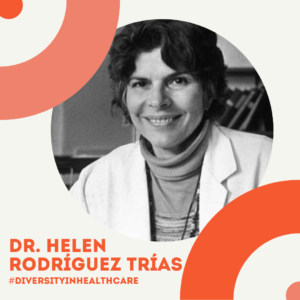
Helen Rodríguez Trías was a pediatrician, educator and women’s rights activist. She was the first Latina president of the American Public Health Association (APHA), a founding member of the Women’s Caucus of the APHA, and a recipient of the Presidential Citizens Medal. She is credited with helping to expand the range of public health services for women and children in minority and low-income populations in the United States, Central and South America, Africa, Asia, and the Middle East.
 Born in New York in 1929, Helen Rodríguez spent her early years in Puerto Rico, returning to New York with her family when she was 10. Growing up as a Puerto Rican in New York City, she experienced racism and discrimination first-hand. Rodriguez-Trias earned her BA degree from the University of Puerto Rico in 1957 where she became a student activist on issues such as freedom of speech and Puerto Rican independence. She then entered the University of Puerto Rico’s school of medicine and obtained her medical degree in 1960. Rodriguez-Trias chose medicine because it “combined the things I loved the most, science and people”
Born in New York in 1929, Helen Rodríguez spent her early years in Puerto Rico, returning to New York with her family when she was 10. Growing up as a Puerto Rican in New York City, she experienced racism and discrimination first-hand. Rodriguez-Trias earned her BA degree from the University of Puerto Rico in 1957 where she became a student activist on issues such as freedom of speech and Puerto Rican independence. She then entered the University of Puerto Rico’s school of medicine and obtained her medical degree in 1960. Rodriguez-Trias chose medicine because it “combined the things I loved the most, science and people”
During her residency at the University Hospital in San Juan, she established the first center for the care of newborn babies in Puerto Rico. Under her direction, the hospital’s death rate for newborns decreased 50 percent within three years.
When she returned to New York in 1970, Dr. Rodriguez-Trias decided to work in community medicine. After attending a conference on abortion at Barnard College in 1970, she focused on reproductive rights. Throughout the 1970s, Dr. Rodriguez-Trias was an active member of the women’s health movement. She was inspired by “the experiences of my own mother, my aunts and sisters, who faced so many restraints in their struggle to flower and reach their own potential.”
Rodriguez-Trias joined the effort to stop sterilization abuse. Poor women, women of color, and women with physical disabilities were far more likely to be sterilized than white, middle-class women. Rodriguez-Trias was a founding member of both the Committee to End Sterilization Abuse and the Committee for Abortion Rights and Against Sterilization Abuse, and testified before the Department of Health, Education, and Welfare for passage of federal sterilization guidelines in 1979. The guidelines, which she helped draft, require a woman’s written consent to sterilization, offered in a language they can understand, and set a waiting period between the consent and the sterilization procedure.
Rodriguez-Trias was also a founding member of both the Women’s Caucus and the Hispanic Caucus of the American Public Health Association and the first Latina to serve as president. Toward the end of her life she said, “I hope I’ll see in my lifetime a growing realization that we are one world. And that no one is going to have quality of life unless we support everyone’s quality of life…Not on a basis of do-goodism, but because of a real commitment…it’s our collective and personal health that’s at stake.”
In January 2001 she received a Presidential Citizen’s Medal for her work on behalf of women, children, people with HIV and AIDS, and the poor. Helen Rodriguez-Trias died of complications from cancer in December, 2001.
Information and photo source: https://cfmedicine.nlm.nih.gov/physicians/biography_273.html